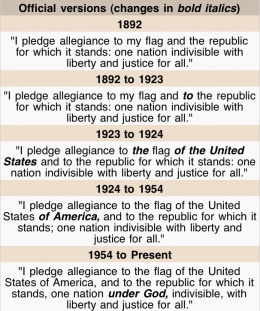General Discussion
Related: Editorials & Other Articles, Issue Forums, Alliance Forums, Region Forumshootinholler
(26,449 posts)pampango
(24,692 posts)Gothmog
(145,489 posts)Art_from_Ark
(27,247 posts)It's actually mentioned in "The Star Spangled Banner", written in 1814:
"And this be our motto: In God is our trust"

And it first appeared on US coins in 1864, at the behest of a preacher who thought that adding that motto to our coinage would bring the Civil War to a quicker end.

The Coinage Act of 1866 mandated that it be inscribed on all US coins over 10 cents in face value (with the exception of certain gold coins).
Cirque du So-What
(25,965 posts)what would witty merchants mount on the wall in their establishments? You know the one, with the line following 'in God We Trust'...
'...all others pay cash.'
A particularly pithy paean to the god of mammon.
The2ndWheel
(7,947 posts)Martin Eden
(12,875 posts)"One" = unity & equality (no discrimination)
Our country is far from achieving that, but I think it's an ideal we should strive for.
Major Nikon
(36,827 posts)Martin Eden
(12,875 posts)Igel
(35,337 posts)Most didn't find it that way. Those who believed saw it as non-divisive. Those who didn't believe shrugged without insisting on being offended.
Major Nikon
(36,827 posts)The first instance of someone insisting a reference to god appear on US coinage went like this...
http://en.wikipedia.org/wiki/In_God_we_trust
In the 50's the reason why it was adopted as the official motto was to divide the US from 'godless communism'.
It's always been used to drive a wedge between believers and non-believers, from the very beginning and ever since.
Igel
(35,337 posts)But there are better ways of saying that.
"Out of many, one" implies 13 states becoming one entity. Not 13 separate but equal entities. We had a confederation before the federation we're in now, and it didn't work. It's a singular word, "one." And it's neuter. A collective entity.
It also refers to many peoples coming together to form one people. Not separate but equal peoples. We tried that. It wasn't the ideal that much of the US set for itself, at least not long term. It didn't work. In the desire to be sure that we're all true to our skin color and the culture and values that apparently are intrinsic to those skin hues, in an attempt to hold onto unchanging cultural traits that change over a hundred years and are learned but serve as a demand for power and status, we really want it the way one politician put it in a notorious gaffe: That our motto is "out of one, many."
The Latin motto is close to a restatement of the melting pot; the gaffe reverses that in a way that was trendy when he was in college and to the present. People have to do some fancy footwork to make it mean "salad bowl." But we do that. A lit professor told me a certain early 1800s work had women's rights as its central theme. My objection was that women simply didn't occur as main characters, and as peripheral characters were just mixed in with the peripheral men. "Precisely. Silence. The contrived manner in which women were marginalized and relegated to the periphery is the primary message. It screams for women's emancipation and right to vote."
It was a work that dealt with an army office and his aide after their small unit was destroyed behind enemy lines in the early 1800s and how they fought their way back to their all-male unit. The peripheral characters were the occasional local villagers, almost all hostile and therefore either avoided or to be killed, or their sweethearts in memories and flashbacks--up there with roast beef and warm rooms. Simple topic, no women soldiers at the time. Written by somebody who lived in the area and fought on that "front." Silence, sometimes, is just silence. The naive reading is correct. Anything but silence in that work would have necessarily been contrived. But since she required that every work be about her pet topic, there you have it. (She'd have been happier if a strong local woman had killed the men. Then it would have been pro-women, anti-male, anti-imperialist and pro-indigenous struggles. Alas, such was not the Caucasus in the early 1800s.)
E pluribus unum.
1monster
(11,012 posts)1monster
(11,012 posts)The translation I've always seen used is "From many, one." The motto was not about diversity. If you remember you pre-revolutionary history, you will recall that colonies were in competition with each other and not necessarily disposed to be friendly. They were, in effect, thirteen separate colonial nations.
When the British government refused to hear or grant the petitions for representation, among other things, the colonists worked hard to develop a united front.
From many colonies, one nation.
MrScorpio
(73,631 posts)On the back, over the word "One", there's no "In God We Trust" printed there. I also have another silver certificate, series 1957, with the phrase printed on it.
When I got both of them different times I noticed the difference.
lonestarnot
(77,097 posts)davidn3600
(6,342 posts)Out of many colonies, one country. In other words it means to say unity.
I doubt the founding fathers were trying to celebrate diversity specifically by using that motto. They cared more about unity for a very young nation they were worried about not holding together in the early years.

